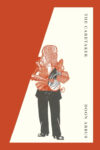“As usual, I stood her on the skis in front of me, and as the forest began flitting by on both sides of us, gliding away backward ever faster toward the retired forest ranger’s clearing, with my nails and my teeth I tore that new spring dress right off of her; and, using my knife, I snipped my cement-armored trousers off my waist until, finally, once again I felt her velvety behind in my lap.”
Both the content and context of this passage from Ádám Bodor’s The Sinistra Zone illustrate the twisted logic that drives the novel down a nauseatingly loopy “scenic route.” This scene of anal ski-fucking occurs immediately after Andrei Bodor, the pseudonym-ed protagonist, knifes a man under the orders of the Sinistra territory’s “new mountain infantry commander.” The woman he happens to be anal-ski fucking has been personally selected to be Andrei’s bedmate (or anal ski-mate). She also happens to be married, but that’s okay with both husband and wife, as part-time corpse watchman is a prestigious position, entitling Andrei Bodor to a bedmate of his choice (no dental, however). Besides, the woman’s real husband, Severin Spiridon, sort of owes it to Andrei: our protagonist accidentally resuscitated him. So Severin helps his wife primp before she goes to Andrei’s lodge for a romp in the adulterous sack. It is unpleasant but necessary, treated with the sort of perfunctory capitulation one might feel after settling on dinner at the Olive Garden.
The book abides by its own logic, until it doesn’t. It changes its own emotional and physical rules as consistently as a 5-year-old playing The Game of Life — it is oneiric both in its imagery and in its ever-askew, mercurial relationships. But between stand-out images — albino twins with a dangerous propensity for anal impalement, a red-headed eight year old with glow-in-the-dark eyes who’s in love with a Gandalf-ian meteorologist, corpses nailed to the ground like memorial statues — the reader finds himself stuck in a parade of grotesquerie that, unfortunately, begins to plod with every tangent.
The Sinistra Zone is a first person account (occasionally meandering at random into the third) of Andrei Bodor’s time spent in a militarized region of a generically Eastern European territory called The Sinistra Zone. And in case you were wondering, the Sinistra Zone is, indeed, a sinister zone. Far from taking a vacation, Andrei Bodor has come here with the sole purpose of finding and rescuing his adopted son. Upon entering the zone, he’s given a pseudonym, a dog-tag, and his first odd job as an overseer of berries and mushrooms, which are harvested to feed hundreds of government-owned bears. Eventually, despite the government’s many attempts to kick him out of the territory, Andrei manages to ingratiate himself to higher-ups and prove his worth.
The Sinistra Zone depicts a sort of backwoods, ramshackle totalitarianism. With its two-dimensional characters and fantastical flourishes, it is hard not to take the novel for political allegory with an anti-communist agenda. But though the critique begins pointedly, after working its way through the book’s vulgar and whimsical digestive tract, it plops out the back end of the novel watered down and amorphous. This is not the shrewd, organized and high-tech government of 1984; in this forested bureaucratic fairy tale, we get the feeling that Big Brother is, indeed, watching, but in the form of a dwarf peering out from behind a toadstool. While the government sanctions everything from our protagonist’s lodgings and sexings to the nefarious acts he eventually commits, we never truly get any understanding of what the government is, for the highest ranking individual ever mentioned in the book is the “mountain infantry commander.” However, from the variety of languages spoken in the zone, as well as the diversity of Eastern European ethnicities represented, we can infer that it’s an amalgamated and essentialized portrait of Soviet satellite states.
Bodor is known as a vehement anti-communist, and the disorderly government’s patrol of residents’ identities, its strict border policies and xenophobia, and its attempts to neutralize class provide a backbone — albeit a rickety one that buckles under the story’s heavy lyricality — for his disdain.
While Paul Olchvary’s translation consistently captures the lilt of grandfatherly formality of Andrei’s narration, the novel itself seems at times sloppily structured. Despite the glory of the prose (evident in poetically repulsive passages such as: “Hamza Petrika took his brother’s rubber boots under his arm and started back toward the bear reserve without a word, letting out colossal farts on the way, as if his soul was fast departing his body”), key details are often repeated as though each chapter were written as the beginning of the novel and never edited when rearranged. Further, the author’s shifts between the first and third person — mostly occurring with no fluidity from chapter to chapter — seem more like lazy strategizing than stylistic boldness. Nevertheless, if you can stomach questionable character motivation and a plot too digressive to ever be gripping, the flatulent beauty of Bodor’s prose and the panoply of unsettling images are worth the few hours it’ll take to get through this dense but short novel.
This post may contain affiliate links.








